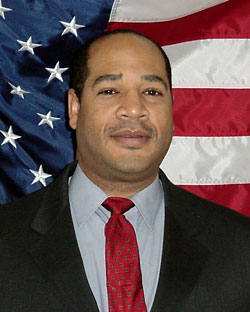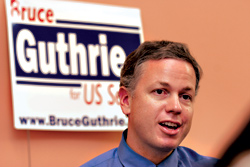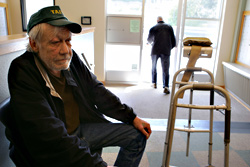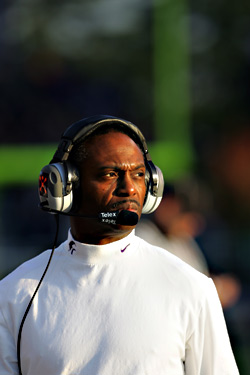A week ago, I finished writing a small profile of Ken Saucier, president of the Seattle Police Officers Guild (SPOG), for next week’s Best of Seattle issue of Seattle Weekly and noted that, in a city of politicians and public officials afraid to speak out about the weather, much less any pressing civic matter, Saucier was refreshingly different. He had attitude, shot off his mouth, didn’t shrink from judging those he disliked. Saucier was one of the best interviews in town for those of us who thrive on real characters and good material.
Then on July 21, he rolled his pickup in a single-car accident on Interstate 90 in Idaho, just east of the Washington state line. He was returning from Ohio, where he and a friend, Wesley Lorenz, competed in the National Rifle Association’s National Pistol and Rifle Championships. Saucier placed second in the High Master–Police .45-caliber championship and was sixth overall among cops.
Saucier died at the scene of the crash. His friend suffered minor injuries. Saucier was 40 years old and left behind a wife of 18 years and three daughters. The whole thing feels like a theft. I lost a source I deeply enjoyed interviewing—and BS’ing with—and the Seattle Police Department lost the man who, in many ways, was its best and most forthcoming public figure.
Over the past week, a lot of media have focused on his honesty and the way he always fought for the rights of street cops. Both true. What’s been lost in the official story line, however, is what a powder keg of a man was Ken Saucier (pronounced “SAW-sear”). He wasn’t careful like most Seattle pols, with their noncommittal vocal inflections. When you asked him a question, the answer came out like lava from Kilauea, especially when you asked about politicians, their handlers, police management, and contract negotiations with the city.
Deputy Mayor Tim Ceis, he said, was a “freakin’ backstabber.” According to Saucier, when contract talks began two years ago, the city agreed to certain conditions and bargaining points. Law forbade him from telling me what they were. But he made it clear that after SPOG had agreed to those points, Ceis came in and changed the game. Saucier didn’t like that. Were they trying to intimidate him? “I told one of them,” he said, relishing the memory, “‘I’ve had a gun in my face before—you don’t intimidate me.'”
He liked the city’s contract offer even less, saying that asking cops to pay a portion of health care costs, despite an unspecified pay increase, “amounted to a rollback.”
Saucier’s most public wrangling with a politician was with City Council member Nick Licata, who took over as head of the council’s Public Safety, Civil Rights, and Arts Committee last January. Licata had been on what Saucier considered a “jihad,” trying to change the rules of operation for the three citizen members of the Office of Professional Accountability Review Board, so they could review closed OPA investigations without the redaction of officers’ names. He called Licata “sneaky” and said he was “plotting” with community activists to turn OPA into a full-blown civilian review board of the police. He was a bit paranoid on that point, I said. We moved on.
When everyone says Saucier had the best interests of street cops at heart, they are almost understating his concern. He’d been on the streets himself, in the South and North precincts since 1986, breaking up rock houses in the South End and patrolling University Avenue on third watch, a beat he told me he loved. He’d been a SWAT member, a firearms trainer, and then, after mouthing off regularly about how cops were getting screwed, ran for and became president of the union—the first African American ever in that position. He was re-elected last December.
Saucier was furious that some citizens continued to think cops were racists, an instrument of The Man to hold down minorities. As far as he was concerned, racism on the force was nonexistent, and it was time for the public and anti-cop activists to give cops a break. Unlike the first time we talked, 18 months earlier, when I was fairly new in town, Saucier wasn’t making noise about depolicing. (Don’t like what the cops are doing? Fine. They’ll patrol someplace they’re wanted.) He was simply Ken being Ken, worried about anything that affected the health, safety, and working conditions of officers. Besides, he had bigger worries that last time we talked a few weeks ago.
Saucier was disturbed that budget cuts had reduced the number of officers working routine patrol to fewer than the cops on the street in 1973. He was joking, right? “Nope,” he said. He went up to his office and returned with a copy of a 1973 SPD report. Sure enough: 577 patrol cops in 1973 versus about 500 today. “We’re stretched pretty thin,” he said. “It’s gotten to where property crime is not a priority with SPD.” He warned me not to buy the “twisted logic” of SPD upper management (I’ll not say who his targets were, except to say it wasn’t Chief Gil Kerlikowske), who claim they could turn all those specialty unit forces back onto the streets in a heartbeat.
Saucier knew my apartment had been burgled the previous month, and he described his own fears after someone tried to climb through the window of his house years ago in South Seattle. His wife was home at the time, pregnant. She screamed and the burglar took off. “I was furious,” he said. “What if he had come in and attacked her?” Soon after, the Sauciers moved out of Seattle.
I liked all of this straight talk from Saucier. He seemed to like getting it from me in return. I sometimes wrote articles critical of the actions of street cops, and he was OK with that because I was fair and called him for comment. “Hey, if we’ve got it coming to us, kick us in the shins,” he said on more than one occasion. He even walked me through the finer points of police tactics in the use of force. Sadly, the rest of the SPD just isn’t that forthcoming with reporters—at least not this one.
But all of that is almost beside the point. As I sat there and listened to him, it struck me that Saucier was a man wildly in love with his life who’d found a gig he could really sink his teeth into. He was a short, girthy man who smiled and laughed almost all the time and teased people he liked relentlessly. At one point, his cell phone rang. He flipped it open to check the number. “My wife,” he whispered. He answered the phone. “Yeah? What do you want, woman?” he bellowed and immediately began giggling, engaging in the kind of good-natured ribbing that only comes in long, solid relationships.
And that was when, in a weird way, I became a bit jealous of Saucier. He had life exactly where he wanted it. Many of us cannot make the same claim. Many of us just don’t have the character to be as honest as Saucier.
I left him that day, thinking how lucky I’d be to deal with him in years to come. And then that damn accident, after which I thought how unlucky we all were to lose someone public who went through life with so little concern for what the gatekeepers of society thought of him. Civic life in Seattle will be a lot less interesting.
Saucier’s three daughters—two of them teens, one a preteen—are without a father, and his wife, Suzanne, has lost a husband. You can help them by donating at any Wells Fargo bank branch.








